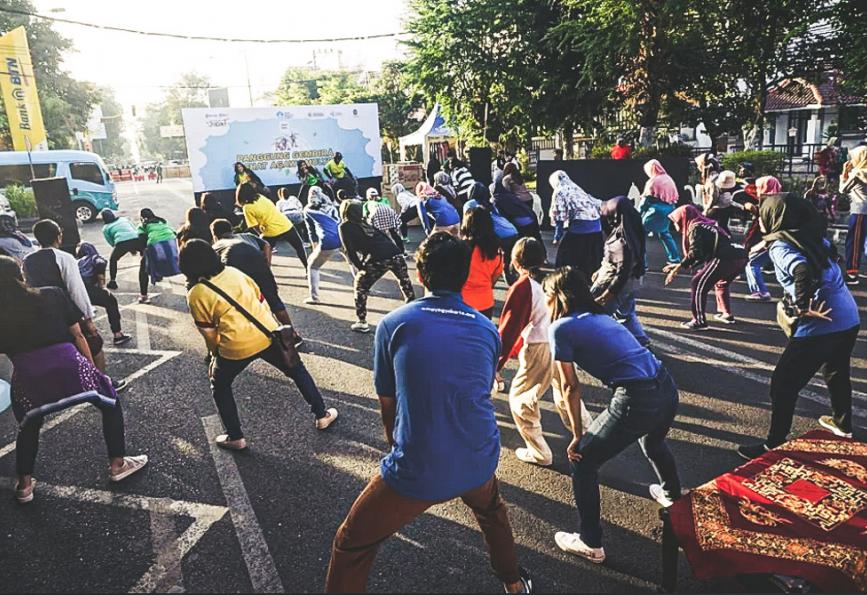
Around this time, the World Mosquito Program and the Yogyakarta City Health Office developed a dengue-themed music jingle. Everyone, young and old, was invited to get dancing and upload the results to social media.
On Car Free Day in Yogyakarta, a prize giving ceremony honoured the best dancers at Jalan Sudiman, with winning teams of young people and adults and an institutional category.
With free breakfast and coffee to keep their energy up, and live music for inspiration, audience members learned Zumba and line dancing from professional instructors. The competition winners danced their winning dances and took away some of the total prize pool of 12 million rupiahs.
To feed people’s minds, the World Mosquito Program team set up a mini laboratory showing adult mosquitoes, eggs, larvae and pupae, and used games to inform people about dengue and Wolbachia mosquitoes, with help from Wolly, the World Mosquito Program Yogyakarta mascot.
The prevention and control of dengue is a shared responsibility that the World Mosquito Program takes seriously. It works with local communities to ensure they are well informed and involved – local Yogyakarta residents have helped host around 8000 buckets of Aedes aegypti mosquito eggs with Wolbachia.
Wolbachia mosquitoes - evidence of reduced dengue transmission
At the 4th Asia Dengue Summit in Jakarta in July 2019, World Mosquito Program entomologist Warsito Tantowidjoya and Director Professor Scott O’Neill outlined the latest developments from two studies conducted in Yogyakarta.
Warsito’s presentation described the use of Wolbachia mosquitoes as a promising dengue vector control, while Scott’s presentation updated the audience on the global evidence for Wolbachia control of dengue transmission.
The World Mosquito Program team ran a booth with information about Wolbachia mosquitoes; when the Indonesian Minister of Health visited the booth, World Mosquito Program Principal Investigator Professor Adi Utarini explained to him that the Wolbachia mosquitoes are a safe and natural way to reduce the transmission of the dengue virus.
Once a week the mosquitoes trapped in devices called BG Traps are collected and taken to the World Mosquito Program entomology laboratory in Yogyakarta, where they are identified by Warsito and his team. Two years after the releases finished, they have found high proportions of Wolbachia-mosquitoes in the local populations, suggesting that the transmission of mosquito-borne viruses will be reduced. In parallel, local community health centres have been counting the number of people coming to the clinics with suspected dengue and it looks like the number of locally transmitted cases is falling, as expected.
Thanks go to the Center for Tropical Medicine of the Faculty of Medicine, Public Health, and Nursing at Gadjah Mada University and the Tahija Foundation.
Find out more about the impact of our work.

